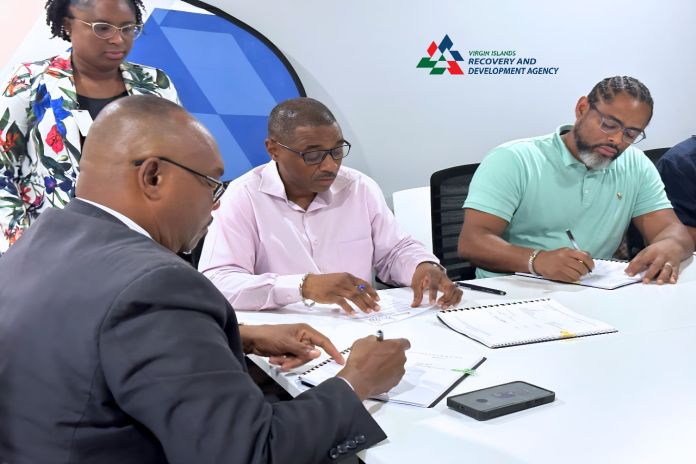![]() TORTOLA, BVI – The Virgin Islands Recovery and Development Agency (RDA) has signed a contract for the design and construction management of the new Agriculture and Fisheries Complex. The contract was awarded to Trojan Design and Development Ltd in the amount of US$95,200.00 on 17 October 2024 following a competitive bidding process.
TORTOLA, BVI – The Virgin Islands Recovery and Development Agency (RDA) has signed a contract for the design and construction management of the new Agriculture and Fisheries Complex. The contract was awarded to Trojan Design and Development Ltd in the amount of US$95,200.00 on 17 October 2024 following a competitive bidding process.
In attendance were the RDA’s liaison officer in the premier’s office Dr Lavon Chalwell-Brewley, representatives from the RDA inclusive of the director of programme delivery Shaina Smith-Archer, project manager Nioka Anderson Murray, procurement officer Lashuana Marshall, communication officer Akeema Crabbe and community liaison officer April Glasgow.
The contract includes two key components
Phase one (design phase) will produce a comprehensive design guided by stakeholder feedback. The design will include facilities for processing, storage, and distribution of farmers’ and fishers’ products. It will feature an abattoir, fish processing facility, and office spaces for administrative and technical services. The goal of the design is to create a facility that is functional, flexible, sustainable, resilient, compliant with regulations, and capable of fostering community harmony.
Phase two of the contract involves construction management to ensure the facility is built according to the approved designs.
The new Agriculture and Fisheries Complex is envisioned to provide farmers and fishers with the resources they need to increase productivity, access new markets, and reduce the Territory’s dependence on imports.
Junior minister for agriculture and fisheries Dr Karl Dawson delivered remarks on behalf of premier Dr Natalio Wheatley at the contract signing ceremony.
Providing context, the junior minister shared that the project was conceived with the passing of the Virgin Islands Food Security and Sustainability Act, 2022 which addresses areas in agriculture necessary to move the sector forward.
“This facility will allow a level of aggregation and consolidation that will facilitate trade between those who are producing and those who will eventually be supplying the products,” Dr Dawson said. “It is the government’s aim to increase food security and food sovereignty in the Territory, and a key element is to produce more by making more land available for agriculture, making fisheries more sustainable, and addressing issues related to water access which is a key input in production.
“The Complex design is integral to this because as we produce more, we do not want a system where our farmers and fishers in addition to producing the products that they are responsible for, now have to go and make individual arrangements with restaurants or the supermarkets,” the junior minister added.
Client recipient representative and director of agriculture and fisheries Theodore James spoke on food safety and the value-added service of the facility.
“One of the things that is important for us in the industry is food safety. Once we know people have produced in a manner that is safe, we need to focus on how we will manufacture that food in a safe manner. We are now going to have a value-added, modern facility that will ensure food is processed at a standard which we will be proud of,” adding. “We are moving one product to multiple products in this facility and will provide the means to export food at the same time.”
RDA’s chief executive officer Anthony McMaster, said:
“It’s a pleasure to reach this milestone and the RDA intends to deliver this project on time and within budget,” adding, “ the project will be delivered by the third quarter of 2026”.
Ronnie Lettsome of Trojan Design and Development Ltd, the architects for the project, said:
“We will make this new design our priority and the design will be done up to standards and within budget. We appreciate your confidence in us and I’m happy to be a part of this project that will push the BVI forward in terms of agriculture and fisheries.”
The new Agriculture and Fisheries Complex will be a modern facility with the value-added functionality to process food in a safe manner. It will replace and enhance the facilities destroyed by the hurricane in 2017, modernizing the abattoir, re-establishing the fish processing hub, and offering new spaces for administration, technical services, and educational programs with a view to processing and exporting food products.





